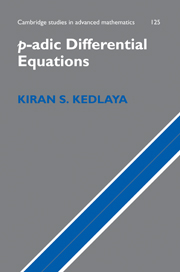Book contents
- Frontmatter
- Contents
- Preface
- 0 Introductory remarks
- Part I Tools of p-adic Analysis
- 1 Norms on algebraic structures
- 2 Newton polygons
- 3 Ramification theory
- 4 Matrix analysis
- Part II Differential Algebra
- Part III p-adic Differential Equations on Discs and Annuli
- Part IV Difference Algebra and Frobenius Modules
- Part V Frobenius Structures
- Part VI Areas of Application
- References
- Notation
- Index
2 - Newton polygons
Published online by Cambridge University Press: 05 August 2012
- Frontmatter
- Contents
- Preface
- 0 Introductory remarks
- Part I Tools of p-adic Analysis
- 1 Norms on algebraic structures
- 2 Newton polygons
- 3 Ramification theory
- 4 Matrix analysis
- Part II Differential Algebra
- Part III p-adic Differential Equations on Discs and Annuli
- Part IV Difference Algebra and Frobenius Modules
- Part V Frobenius Structures
- Part VI Areas of Application
- References
- Notation
- Index
Summary
In this chapter, we recall the traditional theory of Newton polygons for polynomials over a nonarchimedean field. In the process, we introduce a general framework which will allow us to consider Newton polygons in a wider range of circumstances; it is based on a version of Hensel's lemma that applies in not necessarily commutative rings. As a first application, we fill in a few missing proofs from Chapter 1.
Introduction to Newton polygons
We start with the possibly familiar notion of the Newton polygon associated with a polynomial over a nonarchimedean ring.
Definition 2.1.1. Let R be a ring equipped with a nonarchimedean submultiplicative (semi)norm | · |. For ρ > 0 and P = Σi Pi Ti ∈ R[T], define the width of P under the ρ-Gauss norm | · |ρ as the difference between the maximum and minimum values of i for which maxi{|Pi|ρi} is achieved.
Proposition 2.1.2.Let R be a ring equipped with a nonarchimedean multiplicative seminorm | · |. For ρ > 0 and P, Q ∈ R[T] the following results hold.
(a) We have |PQ|ρ = |P|ρ|Q|ρ. That is, | · |ρis multiplicative.
(b) The width of PQ under | · |ρequals the sum of the widths of P and Q under | · |ρ.
Proof. For * ∈ {P, Q}, let j*, k* be the minimum and maximum values of i for which maxi {|*i| ρi} is achieved.
Information
- Type
- Chapter
- Information
- p-adic Differential Equations , pp. 35 - 44Publisher: Cambridge University PressPrint publication year: 2010
